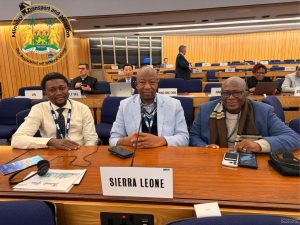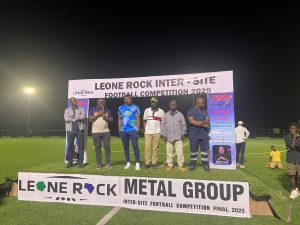Hon. Emerson Lamina Applauds FG Gold’s Milestone in Sierra Leone Mining

By Abdul Rahman Bah
On the afternoon of Friday, November 15, 2024, a dynamic and insightful interview took place at the Parliament of Sierra Leone, featuring Honorable Emerson Lamina, the distinguished Committee Chairman for Mines and Minerals. The session, held in the esteemed halls of Parliament, was conducted by members of the Sierra Leone Parliament Press Gallery, who sought to gain deeper insights into the country’s mining sector, its challenges, and future prospects.
In his introduction, Honorable Lamina, who represents the resource-rich Kono District, provided an overview of his duties as Chairperson of the Mines and Minerals Committee. He explained the immense responsibility of overseeing mining operations across Sierra Leone to ensure that these activities align with the country’s constitutional mandates and best serve the interests of the nation and its communities. Lamina emphasized the importance of balancing national development with environmental and social considerations, especially in communities directly affected by mining activities.
During the interview, he outlined the five core functions that Members of Parliament (MPs) fulfill in Sierra Leone’s governance structure. These include:
- Representation: MPs serve as the voice of their constituents, advocating for their needs and ensuring their concerns are heard at the national level.
- Lawmaking: MPs are responsible for drafting, debating, and passing legislation that addresses a wide array of national issues, including social, economic, and environmental matters.
- Oversight: MPs play a crucial role in monitoring government ministries, departments, and agencies (MDAs) to ensure they operate within the law and meet policy standards.
- Budgetary Approval: MPs scrutinize and approve the national budget, ensuring financial resources are allocated appropriately and transparently.
- Promoting Unity and Stability: MPs help foster national unity, advocating for peace and collaboration to maintain social harmony in Sierra Leone.
A critical part of the conversation focused on the role of Parliament, particularly the Mines and Minerals Committee, in overseeing the mining sector. Hon. Lamina referenced Section 93 of the Sierra Leone Constitution, which mandates MPs to perform oversight functions over relevant MDAs, including the Ministry of Mines and the mining companies themselves. He highlighted how effective oversight is essential not only for compliance with mining laws but also for ensuring that mining companies meet their social responsibilities, contributing positively to the communities in which they operate.
Honorable Lamina emphasized that mining activities should not only generate revenue for the nation but also promote sustainable practices that benefit local communities. He explained how robust oversight can lead to community development, sustainable environmental practices, and greater accountability from mining companies.
One of the key highlights of the interview was Hon. Lamina’s recognition of Chief Oliver Tunde Andrews, the visionary behind FG Gold—a company that has made a significant impact on Sierra Leone’s mining landscape. Lamina praised Chief Andrews for his exemplary Corporate Social Responsibility (CSR) efforts, which have already created lasting benefits for local communities, even before the company has embarked on large-scale gold production.
Among the CSR initiatives highlighted by Hon. Lamina were:
- Education: Chief Andrews has led efforts to build a school in Valunia, Bo District, aimed at improving local education and providing children with greater access to learning opportunities.
- Renewable Energy: The introduction of solar energy projects in several communities has provided consistent, sustainable power to areas that previously struggled with unreliable electricity.
- Local Workforce Development: FG Gold has employed 70% of its workforce from the local community, contributing significantly to economic development and reducing reliance on foreign labor.
Honorable Lamina noted that these initiatives set a vital standard for other mining companies to follow, emphasizing that responsible mining practices can create long-term benefits for both the economy and the local population.
In a groundbreaking moment, Honorable Lamina celebrated FG Gold for achieving a historic milestone: securing Sierra Leone’s first large-scale mining license. This significant achievement marks a transformative shift from artisanal mining to structured, industrial-scale operations. Lamina expressed his belief that this change is a turning point for Sierra Leone’s mining sector, signaling a move toward more regulated, responsible, and sustainable mining practices. He emphasized that this development is not only a milestone for the company but also a beacon for potential investors in the country’s mining industry.
Lamina urged local and international investors to look to FG Gold as an example of what can be achieved when companies prioritize both economic success and the welfare of surrounding communities. He encouraged mining companies to adopt ethical, community-centric practices, ensuring that their operations benefit not just the company’s bottom line but also the nation and its people.
Throughout the interview, Honorable Lamina acknowledged that the mining sector in Sierra Leone is not without its challenges, including ongoing controversies and the need for more transparency. He revealed that plans for a press conference would soon be announced, providing a platform for the government to address some of the sector’s issues openly and responsibly. The goal, Lamina stressed, is to foster greater accountability within the industry and ensure that mining companies comply with both legal requirements and ethical standards.
Despite these challenges, Lamina remained optimistic about the future of Sierra Leone’s mining industry. He reiterated that the industry has great potential, particularly if mining companies follow the example set by Chief Oliver Tunde Andrews and FG Gold. The Chairman’s remarks underscored the importance of ethical mining practices that harmonize the interests of businesses, communities, and the environment.
As the interview concluded, Honorable Lamina emphasized that sustainable mining could be the key to Sierra Leone’s economic growth. By combining economic development, community welfare, and environmental sustainability, the mining sector has the potential to play a pivotal role in the country’s future. The role of MPs, as well as companies like FG Gold, will be crucial in shaping the path forward, ensuring that mining activities contribute to the nation’s prosperity while fostering positive, lasting relationships with local communities.
Honorable Lamina’s vision for Sierra Leone’s mining sector reflects a clear commitment to sustainability and community engagement, setting a roadmap for future development and positioning Sierra Leone as a model for responsible mining practices in Africa.





